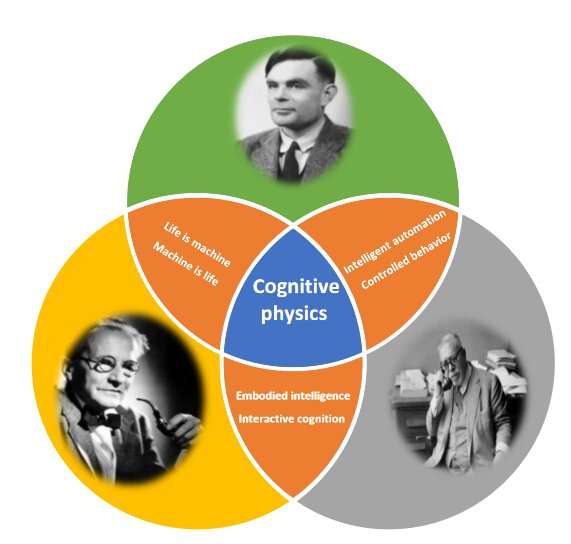
Deyi Li from the Chinese Association for Artificial Intelligence believes that humans and machines have a mutually beneficial relationship.
Wiener and beyond: Machines have behavioral intelligence.
In 1948, Wiener published a book that served as the foundation of the field of cybernetics, the study of control and communication within and between living organisms, machines and organizations. In the wake of the success of the book, he published another, focusing on the problems of cybernetics from the perspective of sociology, suggesting ways for humans and machines to communicate and interact harmoniously.
According to Li, machines follow a control pattern similar to the human nervous system. Humans provide missions and behavioral features to machines, which must then run a complex behavior cycle regulated by a reward and punishment function to improve their abilities of perception, cognition, behavior, interaction, learning and growth.
Through iteration and interaction, the short-term memory, working memory and long-term memory of the machines change, embodying intelligence through automatic control. "In essence, control is the use of negative feedback to reduce entropy and ensure the stability of the embodied behavioral intelligence of a machine," Li concluded.
The strength of contemporary machines is deep learning, which still requires human input, but leverages the ability of devices to use brute force methods of solving problems with insights gleaned directly from big data.
A joint future: From learning to creating
Machine intelligence cannot work in isolation; it requires human interaction. Furthermore, machine intelligence is inseparable from language, because humans use programming languages to control machine behavior.
The impressive performance of ChatGPT, a chatbot showcasing recent advances in natural language processing, proves that machines are now capable of internalizing human language patterns and producing appropriate example texts, given the appropriate context and goal. Since AI-generated texts are increasingly indistinguishable from human-written texts, some are saying that AI writing tools have passed the Turing test. Such declarations provoke both admiration and alarm.
Li is among the optimists who envision artificial intelligence in a natural balance with human civilization. He believes, from a physics perspective, that cognition is based on a combination of matter, energy, structure and time, which he calls "hard-structured ware," and expressed through information, which he calls "soft-structured ware."
He concludes that humans and machines can interact through multiple channels and modes to gain wisdom and intelligence, respectively. Despite their different endowments in thinking and creativity, this interaction allows humans and machines to benefit from each other's strengths.
More information: Deyi Li, Cognitive Physics—The Enlightenment by Schrödinger, Turing, and Wiener and Beyond, Intelligent Computing (2023). DOI: 10.34133/icomputing.0009
Original Text (This is the original text for your reference.)

Deyi Li from the Chinese Association for Artificial Intelligence believes that humans and machines have a mutually beneficial relationship.
Wiener and beyond: Machines have behavioral intelligence.
In 1948, Wiener published a book that served as the foundation of the field of cybernetics, the study of control and communication within and between living organisms, machines and organizations. In the wake of the success of the book, he published another, focusing on the problems of cybernetics from the perspective of sociology, suggesting ways for humans and machines to communicate and interact harmoniously.
According to Li, machines follow a control pattern similar to the human nervous system. Humans provide missions and behavioral features to machines, which must then run a complex behavior cycle regulated by a reward and punishment function to improve their abilities of perception, cognition, behavior, interaction, learning and growth.
Through iteration and interaction, the short-term memory, working memory and long-term memory of the machines change, embodying intelligence through automatic control. "In essence, control is the use of negative feedback to reduce entropy and ensure the stability of the embodied behavioral intelligence of a machine," Li concluded.
The strength of contemporary machines is deep learning, which still requires human input, but leverages the ability of devices to use brute force methods of solving problems with insights gleaned directly from big data.
A joint future: From learning to creating
Machine intelligence cannot work in isolation; it requires human interaction. Furthermore, machine intelligence is inseparable from language, because humans use programming languages to control machine behavior.
The impressive performance of ChatGPT, a chatbot showcasing recent advances in natural language processing, proves that machines are now capable of internalizing human language patterns and producing appropriate example texts, given the appropriate context and goal. Since AI-generated texts are increasingly indistinguishable from human-written texts, some are saying that AI writing tools have passed the Turing test. Such declarations provoke both admiration and alarm.
Li is among the optimists who envision artificial intelligence in a natural balance with human civilization. He believes, from a physics perspective, that cognition is based on a combination of matter, energy, structure and time, which he calls "hard-structured ware," and expressed through information, which he calls "soft-structured ware."
He concludes that humans and machines can interact through multiple channels and modes to gain wisdom and intelligence, respectively. Despite their different endowments in thinking and creativity, this interaction allows humans and machines to benefit from each other's strengths.
More information: Deyi Li, Cognitive Physics—The Enlightenment by Schrödinger, Turing, and Wiener and Beyond, Intelligent Computing (2023). DOI: 10.34133/icomputing.0009








 User Center
User Center My Training Class
My Training Class Feedback
Feedback












Comments
Something to say?
Log in or Sign up for free